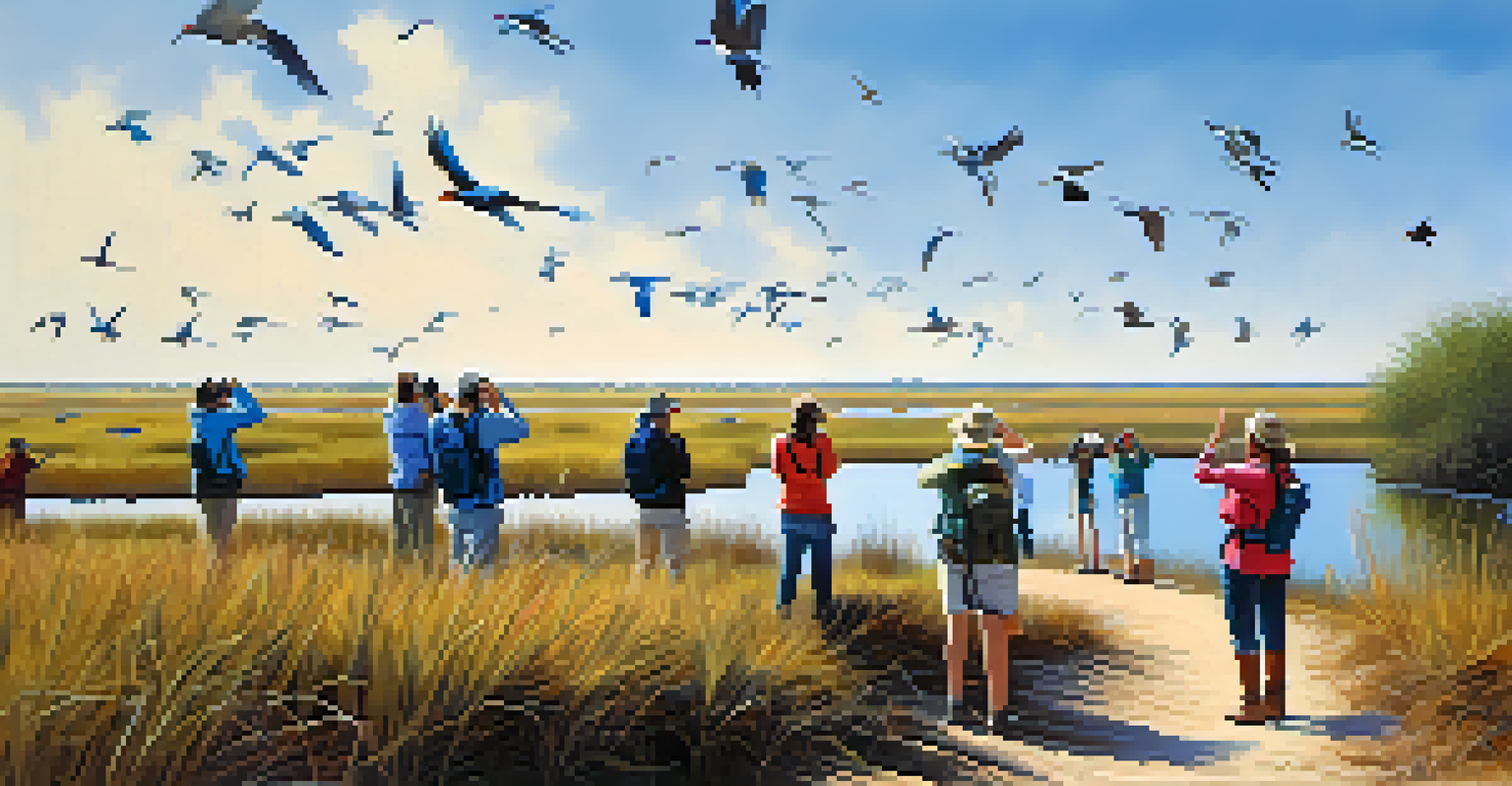The Role of Wildlife Conservation in Spain's Eco-Tourism

Understanding Eco-Tourism in Spain's Unique Landscape
Eco-tourism in Spain is more than just a travel trend; it's a way to appreciate the country's rich natural heritage. With diverse ecosystems ranging from the Pyrenees mountains to the Mediterranean coast, eco-tourism allows travelers to experience Spain's beauty while promoting sustainability. Visitors are drawn to Spain for its stunning landscapes and unique wildlife, making eco-tourism a perfect fit for the country’s natural offerings.
The greatest threat to our planet is the belief that someone else will save it.
By focusing on responsible travel practices, eco-tourism aims to minimize the environmental impact while providing economic benefits to local communities. This creates a symbiotic relationship where nature preserves are protected, and the local economy thrives on tourism. Eco-tourists often choose activities that support wildlife conservation, such as guided nature walks or bird watching, enhancing their travel experience.
Ultimately, eco-tourism in Spain is about fostering a deeper connection with nature and understanding the importance of preserving it. As travelers become more aware of their ecological footprint, they seek experiences that respect and nurture the environment, leading to a growing demand for wildlife conservation initiatives.
The Importance of Wildlife Conservation in Spain
Wildlife conservation in Spain plays a crucial role in maintaining biodiversity and protecting endangered species. The country is home to various unique species, such as the Iberian lynx and the Spanish imperial eagle, making conservation efforts vital for their survival. These species not only hold ecological significance but also attract eco-tourists who wish to witness them in their natural habitats.

Conservation programs often involve habitat restoration, anti-poaching measures, and community engagement to ensure the protection of wildlife. For example, initiatives in Doñana National Park have been instrumental in safeguarding the habitats of numerous bird species. Such efforts not only benefit wildlife but also enhance the eco-tourism experience by providing visitors with opportunities to see these animals thriving in their environments.
Eco-Tourism Enhances Local Economies
Eco-tourism creates economic opportunities for local communities in Spain, fostering sustainable businesses that benefit both residents and conservation efforts.
By prioritizing wildlife conservation, Spain enhances its appeal as a top eco-tourism destination. The presence of healthy ecosystems and diverse wildlife entices travelers, allowing them to explore and appreciate the natural world while contributing to its preservation.
Key Conservation Areas That Attract Eco-Tourists
Spain boasts several national parks and reserves that serve as focal points for wildlife conservation and eco-tourism. One notable example is the Sierra de Guadarrama National Park, where visitors can hike through breathtaking landscapes while observing native flora and fauna. These protected areas offer a glimpse into the country's ecological diversity, drawing nature enthusiasts from around the globe.
In every walk with nature, one receives far more than he seeks.
Another key location is the Picos de Europa National Park, known for its rugged mountains and unique wildlife, including the Cantabrian brown bear. Eco-tourists flock to these areas not only for the stunning scenery but also for the chance to witness conservation efforts in action, such as rewilding projects that aim to restore natural habitats.
These conservation areas serve as both sanctuaries for wildlife and educational hubs for visitors. By engaging with local conservation projects, eco-tourists can learn about the importance of protecting these ecosystems while enjoying unforgettable experiences in nature.
How Eco-Tourism Supports Local Communities
Eco-tourism provides significant economic opportunities for local communities in Spain, allowing them to benefit directly from conservation efforts. By attracting eco-conscious travelers, communities can develop sustainable businesses, such as eco-lodges, guided tours, and local craft markets. This creates jobs and encourages residents to take an active role in preserving their natural surroundings.
Moreover, the revenue generated from eco-tourism can be reinvested into conservation projects, creating a positive feedback loop. For instance, funds from eco-tourism can support wildlife protection initiatives or habitat restoration efforts, ensuring that both the environment and the local economy thrive. This collaborative approach highlights the interconnectedness of conservation and sustainable tourism.
Wildlife Conservation is Essential
Protecting unique species like the Iberian lynx is crucial for maintaining biodiversity in Spain and attracting eco-tourists interested in experiencing nature.
As local communities engage in eco-tourism, they become more invested in preserving their natural resources, further enhancing the appeal of Spain as an eco-tourism destination. This grassroots involvement fosters a sense of stewardship among residents, ensuring that future generations can enjoy the country's rich biodiversity.
The Role of Education in Wildlife Conservation
Education is a key component of wildlife conservation in Spain, both for locals and visitors. Awareness campaigns and educational programs help people understand the importance of protecting natural habitats and the species that inhabit them. By fostering a sense of responsibility, these initiatives empower individuals to take action in their communities.
Many eco-tourism operators incorporate educational elements into their offerings, providing guests with insights into local ecosystems and conservation efforts. For example, guided tours often include discussions about the flora and fauna, as well as the challenges they face. This interactive learning experience enriches the visitor experience and encourages a deeper appreciation for nature.
Furthermore, schools and organizations collaborate to develop conservation education programs that reach a broader audience. By instilling values of environmental stewardship in younger generations, Spain ensures a future where wildlife conservation remains a priority, positively impacting eco-tourism in the long run.
Challenges Facing Wildlife Conservation in Spain
Despite the progress made in wildlife conservation, Spain faces several challenges that threaten its ecosystems. Urbanization, agricultural expansion, and climate change have all contributed to habitat loss, putting immense pressure on wildlife populations. As more land is developed for human use, the delicate balance of these ecosystems is disrupted, making conservation efforts even more critical.
Additionally, illegal hunting and poaching pose significant threats to endangered species. For instance, the Iberian lynx, once on the brink of extinction, continues to face risks from poachers and habitat encroachment. Addressing these challenges requires concerted efforts from government agencies, conservation organizations, and local communities to implement effective protection measures.
Education Drives Conservation Efforts
Educational initiatives empower both locals and visitors to engage in wildlife conservation, promoting a culture of environmental stewardship.
While the challenges are daunting, they also present opportunities for eco-tourism to play a role in conservation. By raising awareness and generating funds through responsible travel, eco-tourism can contribute to the resources needed to combat these threats and promote sustainable practices.
The Future of Wildlife Conservation and Eco-Tourism in Spain
The future of wildlife conservation and eco-tourism in Spain looks promising, driven by growing awareness and engagement. As travelers increasingly seek sustainable experiences, the demand for eco-friendly tourism options continues to rise. This trend encourages local communities and businesses to adopt conservation practices, ensuring that Spain's natural heritage is preserved for generations to come.
Innovative conservation strategies, such as rewilding and community-led initiatives, are gaining traction, demonstrating that sustainable practices can coexist with tourism. By showcasing successful case studies, Spain can inspire other regions to adopt similar approaches, amplifying the impact of wildlife conservation across the globe.

Ultimately, the synergy between wildlife conservation and eco-tourism offers a pathway toward a sustainable future. By prioritizing environmental stewardship and promoting responsible travel, Spain can continue to be a leader in eco-tourism while safeguarding its unique biodiversity.